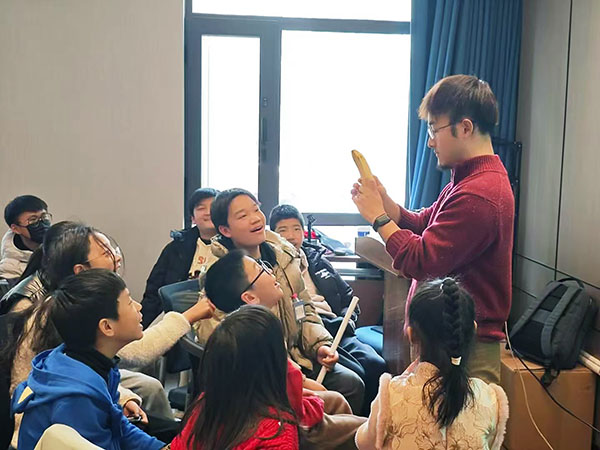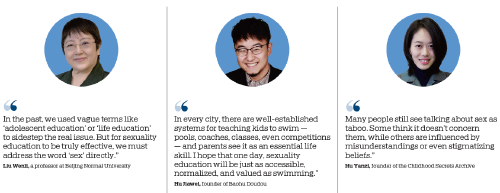From silence to support


Filling the gaps
Hu Jiawei, 31, from Quzhou in Zhejiang province, is the founder of Baohu Doudou, a social enterprise dedicated to children's sexuality education. The name, which means "protect little beans", is a metaphor for safeguarding young lives.
His interest in the field began in 2011 when he attended a sexuality education training session at university. He soon became active in student organizations focused on the topic and later launched his own nonprofit initiative to bring sexuality education programs to rural areas. However, he quickly realized that relying on newly trained volunteers each year was neither efficient nor sustainable.
So in 2015, he established Baohu Doudou as a social enterprise, aiming to fill gaps in sexuality education by adopting a lasting, market-driven approach.
The enterprise works across several key areas: managing sexuality education content on social media, creating scenario-based courses for parents, developing interactive online and offline lessons for children, and providing training for rural teachers and future sexuality educators.
To date, the enterprise has trained over 1,400 instructors — about 95 percent of them women.
The courses for children are designed to be fun and engaging, using board games to teach anatomical terms and help normalize what are often seen as "taboo" words. For parents, the courses address real-life situations they may face, such as how to respond when a child sees adults being intimate or discovers that their child is viewing pornography.
"Parents don't need to be experts," Hu Jiawei said. "But they do need to stop avoiding these issues."
Still, the social enterprise sector for sexuality education in China is in its early stages. "Policies exist, but we lack sufficient class time, qualified instructors, and clear standards," he said.
He is particularly concerned about juvenile offenders. "Data from the Supreme People's Procuratorate shows that rape is the second most common crime committed by minors," he said. "Yet in juvenile detention centers, while legal education is provided, no one teaches them how to understand or manage their sexual impulses."
Liu shares similar concerns. In most primary and secondary schools, sexuality education remains limited to occasional lectures rather than being part of a structured curriculum.
To promote meaningful sexuality education in China, Liu calls for a collaborative effort: the government should provide stronger policy support, families should take responsibility for early education, schools should implement dedicated courses, academic researchers should offer theoretical guidance, and social organizations should help bridge the gaps.
Hu Jiawei often uses a vivid analogy to illustrate what a well-supported system could look like. He compares sexuality education to learning how to swim: "In every city, there are well-established systems for teaching kids to swim — pools, coaches, classes, even competitions — and parents see it as an essential life skill. I hope that one day, sexuality education will be just as accessible, normalized, and valued as swimming."





































